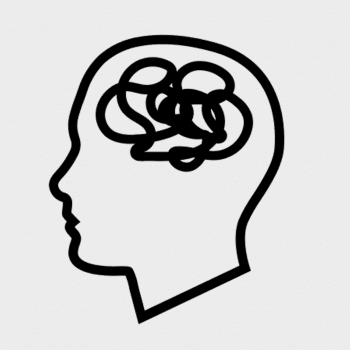We celebrate on this day both Good Shepherd Sunday and Vocations Sunday. The Church reminds us today that each Christian has one task: to listen to the Shepherd’s voice and heed his call.
In the Gospel for today, this unfolds with simplicity: “the shepherd calls his own sheep by name and leads them out… and the sheep follow him, because they recognize his voice.” However, I have found that — in my generation in particular — discernment is often a fraught experience.
This shouldn’t be the case. Not only is distress about discernment unnecessary, but excessive anxiety often reveals that we have misunderstood the very nature of vocation. So, in honour of this day, I am sharing a (neuroscience related, as per usual) image for discerning the voice of the Good Shepherd. Then, I’ll use the image to debunk some myths about discernment and vocation.
The neuroscience of voice recognition
Let’s start with the brain science of recognizing voices. When you hear someone speak, your brain performs two main tasks. First, it recognizes the content of the speech, or the ‘speech message.’ Secondly, it identifies the speaker, the origin of that message. Two separate regions of the brain seem to perform the necessary processing for these tasks. Content recognition happens through the language networks of the left hemisphere. Speaker identification, on the other hand, takes place in the temporal lobe of the right hemisphere. This localisation may explain why you can hear speech without knowing who said it, and why you can realise that someone was speaking without having the faintest idea of what they said.
This is a problem for AI. Computer programs intended to model human voice recognition consistently struggle: although they are usually able to recognize the content of the speech, they remain unable to discriminate well between different sources of speech. So the ability to identify who is speaking to you appears to be a distinctively complex human ability.
So how is this possible? The brain picks up not only the type of speech sound but on speaker-specific features. In other words, the sound waves that carry language also carry information about the embodied speaker, such the length of the person’s vocal tract. Then, particular brain regions — specifically, the posterior superior temporal gyrus and superior temporal sulcus — process these person-specific features of speech. Their activity enables your brain to identify the speaker.
Voice recognition is challenging
Even though we have dedicated neural circuits for speaker identification, it’s not always easy, and we often make mistakes.
This lesson was burned into my mind by an experience I had during my senior year of college. At that time, I was accompanying a dear friend (now my goddaughter) as she became Christian. Just before Easter, the RCIA formators asked us to perform a simple exercise that was meant to model the life of discipleship. They set up an obstacle course of chairs, tables, and bins. Then, they blindfolded the Catechumens and told us sponsors to guide our godchildren from one side of the room to the other using only our voices. The formators made it even more challenging by making distracting noises and shouting false instructions. So, my friend had to strain to pick out my voice and follow my directions. Eventually, after a few bumps and scrapes, she made it to the other side of the room.
Recognising the voice of the Lord
We face the same challenge in our spiritual life. In a world dominated by noise, there are many competing voices that lay false claims to our attention, dictate our desires, and instruct our will. These are the ‘thieves and robbers’ that will lead us astray. A life of Christian discipleship demands that we follow the Good Shepherd alone.
In this light, discernment is simple. All we have to do is recognize His voice and learn to distinguish it from that of ‘ thieves and robbers’. If we love the Lord, and recognize His voice, we can choose to adhere to His will for our lives. So, discernment simply a question of growing in love and knowledge of Him, so that we can heed His calling.

How does this happen? In terms of brain science, it’s a question of strengthening the neural circuits that recognize the speaker-specific features of His voice. Think of how you learned to recognize the voice of your loved ones. Over time, you grew in familiarity with their ‘speaker-specific features’ by listening to them, entering into dialogue with them, sharing life with them.
So, too, with the Lord. First, listen to His voice in daily silent prayer. Cultivate interior and exterior stillness, so that He can speak to you throughout your day. Only through regular dialogue will you learn to pick out Him out of the crowd. Secondly, speak with friends and family members who are ahead of you on the journey of discipleship. They have learned to follow His voice and can teach you to recognize it in your own life. Through these two rocks — prayer and companionship — your heart will find peace.
I have a few more thoughts for you about the metaphor of voice recognition. Namely, some indirect parallels between the neuroscience of voice recognition and the spiritual life can help us debunk several false ideas about vocation.
Debunking discernment myths
Myth #1: God’s call lies in the future
Speech perception is remarkably fast. It takes less than a second for the soundwaves hitting your eardrum to activate distinct language processing regions in your cortex. The network that performs this function is different from the network that imagines future sounds or recalls past voices.
Similarly, we can only discern in the present moment. It’s useless to live in dreams or images of the future, or to remain stuck in the plans you had in past. God calls you through the circumstances you are in right now, even the boring or difficult ones. As helpful as imagination and memory are to the Christian life, they are not substitutes for dialogue with the presence of the living God.
Myth #2: Someone else can tell me what I’m called to do
Like the rest of your brain, the neural circuits that mediate voice recognition are wired through experience. In other words, your ability to recognize speech is the result of hearing many different sounds over the course of your lifetime. In particular, when you were a child, your brain learned from listening to the language of adults who speak your native tongue. And as a result, your brain circuits are the product of your personal history.
Analogously, when it comes to your vocation, no one else can discern for you. God’s call unfolds through time and space through experiences that are exclusively ours. Certainly, we need to be educated well in order to understand our experience; we need the help of others to read the signs contained in our personal history. But when it comes to making a decision, only we can say ‘yes’ to His call for us.
Myth #3. I can figure out my vocation (or produce one!) if I think hard enough
No matter how hard you try, you cannot ‘generate’ voices. Sure, there are pathological instances when you might have an auditory hallucination. But speech perception doesn’t start from inside your brain. Your hearing circuitry only responds to events that take place outside of you.
Similarly, you can’t figure out God’s will through mere logic; discernment does not take place through rational calculus but through relationship. Furthermore, your vocation not something you can generate or choose. God chooses your vocation. Think of Christ’s coming 2000 years ago: those who were attached to their own image of a powerful kingly Messiah rejected and killed Him, while those who were open to the subversive and unexpected the form of His coming discovered the hundredfold. You do not choose your vocation. God comes to you, and all you have to do is say yes.
Myth #4. My vocation will just happen to me
Have you ever been in a lecture, only to leave with no idea what the professor said? Or perhaps realised halfway through a friend’s story that you had no idea what she was talking about? Speech processing is not automatic. It requires the engagement of circuitry in our frontal cortex. In other words, we need to be paying attention in order for our language networks to do their job.
The same goes with discernment: it requires that we pay attention, that we engage our full selves. Your vocation is never automatic, because God’s will always requires the participation of our freedom. As Peguy explains so beautifully, “All the prostrations in the world / Are not worth the beautiful upright attitude of a free man as he kneels / All the submission, all the dejection in the world / Are not equal in value to the soaring up point, / The beautiful straight soaring up of one single invocation / From a love that is free.”
Myth #5. When I enter my final state in life, I can stop discerning
Like all neural circuits, language-related brain networks develop over time. In particular, the regions that recognize ‘speaker-specific’ features of speech learn new voices gradually and through experience, and this process of neuroplasticity never ceases.
Similarly, discernment is a continual process that’s not limited to your vocational state. Again, think of the apostles, whom Christ called by name. Their discernment didn’t end at that moment of encounter. Rather, it gave birth to an ongoing relationship, in which they journeyed with Him. Along the way, they made many mistakes, but they continued adhering to His presence and gradually learned to tend toward Christ, so that after His Ascension they had the courage and wisdom to proclaim the Gospel to all nations. The same is true with us. Your vocation is not just your final state in life. It’s an ongoing relationship with a living presence, so discernment never stops.
If you enjoy the blog, click here to join my mailing list. My second quarterly newsletter is coming out soon.











